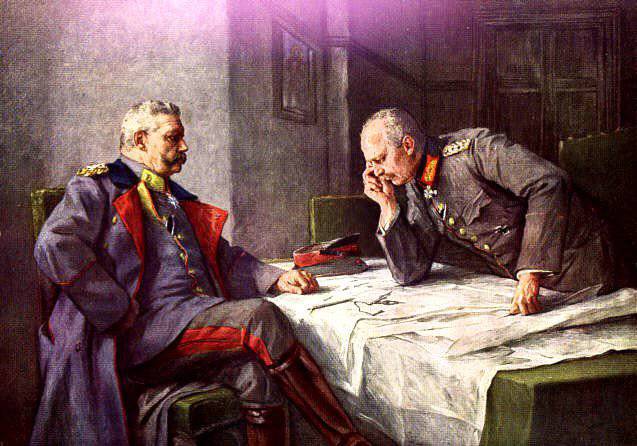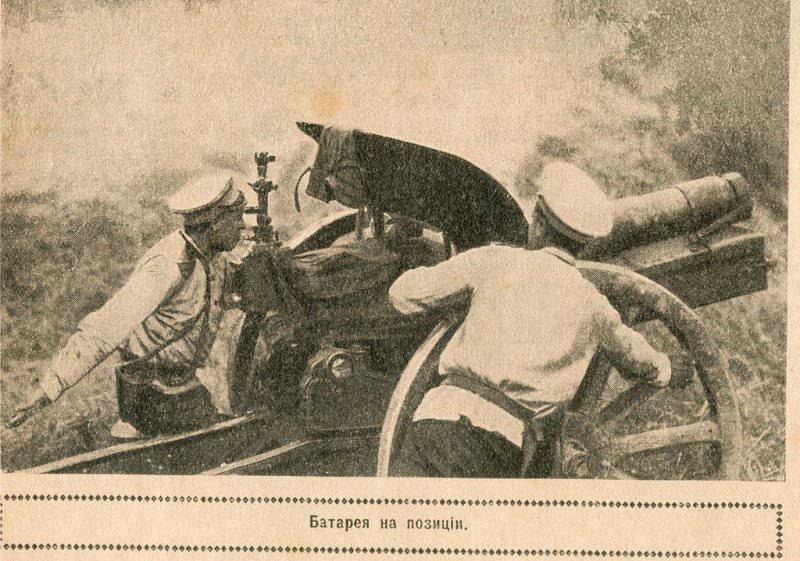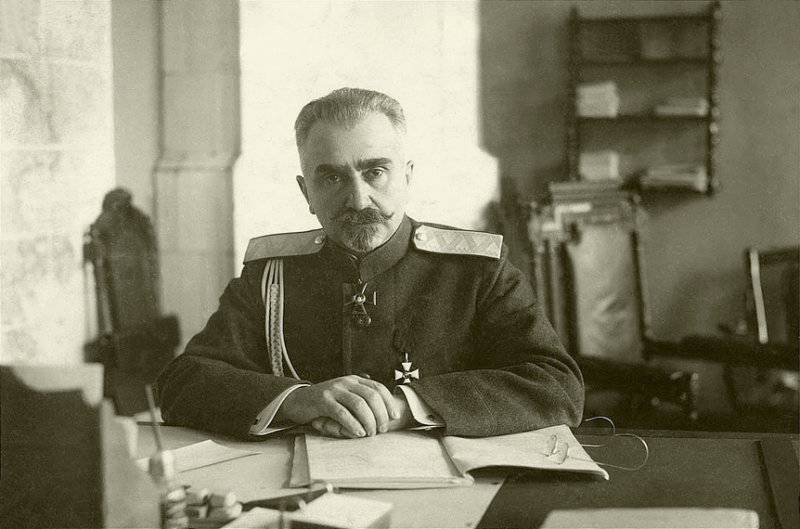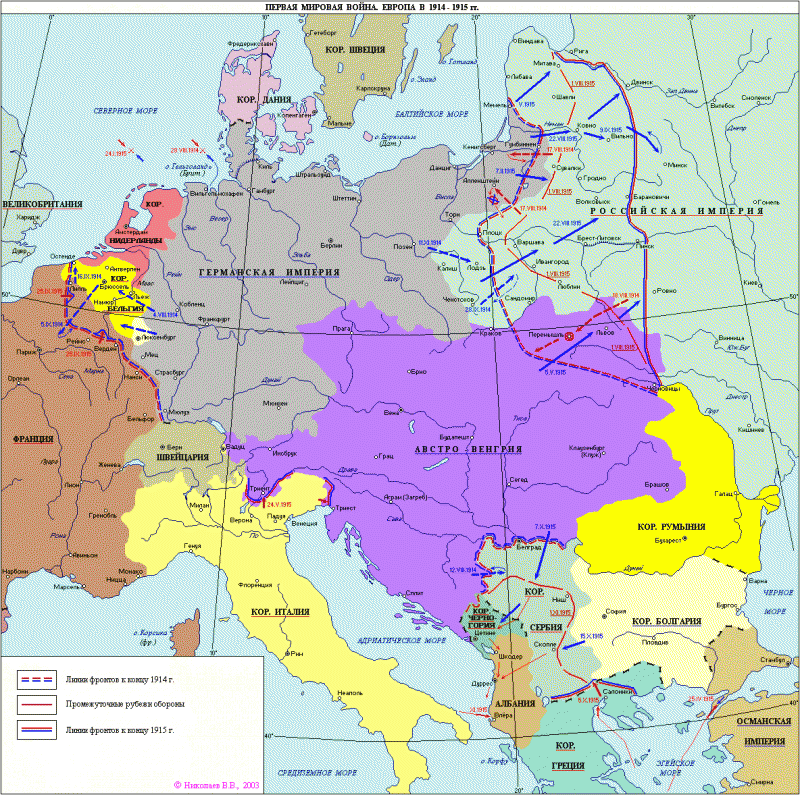Entente and Central Powers military plans for 1915 year
1914 campaign operations of the year did not give decisive results. The hopes of the leading powers for a quick victory did not materialize. On the Western Front, the opposing sides turned to a positional struggle. On the Eastern Front, the possibility of a maneuver war was still preserved, although here the importance of defense increased dramatically. The war took a protracted nature, went to the depletion of all available resources. Unforeseen problems arose before governments and the military that demanded an immediate solution.
Both military-political blocs thought about expanding their resource base at the expense of other states. The Entente succeeded in attracting Japan to its side, which made it possible to remove the threat of a possible Japanese strike on Russians in the Far East and the possessions of the British and French in East and Southeast Asia. The central powers were able to attract the Ottoman Empire, which worsened Russia's position on the Caucasian and Black Sea directions and led to the emergence of several new fronts, dramatically expanding the conflict zone.
At the beginning of 1915, a bitter struggle was going on for Italy, which in the prewar period was tied up with agreements with the Central Powers, but did not hurry to fulfill them after the start of the war and concluded secret treaties with the Entente powers - France and Russia. The Italian government avoided entering the war in 1914 and tacked between the two military-political alliances, hoping to get the best offers and prepare relatively weak armed forces for military operations. Italy wanted to consolidate its position in the Mediterranean and the Western Balkans. At the same time, the ruling circles of Italy understood that neutrality cannot be maintained, since this can lead to undesirable consequences. As a result, the Entente won in a diplomatic battle. Italy joined the Entente under the Treaty of London 13 (26) on April 1915 and 10 (23) in May declared war on Austria-Hungary. With the German Empire, diplomatic relations were maintained until August. This was beneficial to Berlin, which through Italy maintained relations with neutral countries. The Entente promised to reward Italy at the expense of the Austro-Hungarian Empire, transferring the Italians to Trentino, Trieste and other Austrian regions with an Italian population. Italy also received the right to Albania and part of the Slavic regions of the Balkans. As a result, the Italian Front was formed against Austria-Hungary, which chained considerable forces of the powers of the Central Bloc.
The diplomatic struggle continued and for the involvement in the war of the remaining neutral Balkan countries - Greece, Bulgaria and Romania. They had significant strategic reserves of raw materials, especially agricultural, controlled important communications and could put up to 1,5 million fighters. It was a serious factor. Bulgaria was particularly important. It separated the Central bloc from the Ottoman Empire, was an important springboard for the control of Constantinople and the straits. The entry of Bulgaria into the war put Serbia in a critical position and seriously eased the position of Austria-Hungary. The victory over Serbia made it possible to establish a direct rail link through Belgrade and Sofia with Constantinople-Istanbul. The half-million Bulgarian army seriously strengthened the position of the Central Powers in the Balkans. Bulgaria, frustrated at its neighbors by the defeat in the Balkan war of 1913 and desiring territorial increments, easily met Germany. It was necessary only to find common ground of Bulgaria and Turkey, since the two countries were traditional opponents. From June to September negotiations were held in Sofia, during which German diplomats managed to reconcile Bulgaria with Turkey. Bulgaria agreed to act on the side of the Triple Alliance. 6 September 1915 Sofia signed a military convention, treaty of alliance and friendship, and an agreement on financial and material assistance. German diplomacy was able to defeat the Entente. The Bulgarians were promised to give Serbian Macedonia, a part of Romania and the border areas of Turkey to the west of the Maritsa River. As a result, on the whole, pro-Russian Bulgaria (the overwhelming majority of the people were friendly towards the Russians) for the first time in the newest stories It turned out in the camp of the enemies of Russia. Attempts to win over Romania and Greece did not lead to success. Greece and Romania confirmed their neutrality. However, at this stage it suited Vienna and Berlin, as it allowed in the shortest possible time to solve the problem of Serbia.
During this period, there was not only diplomatic struggle for neutral countries. The contradictions between the main members of the warring coalitions were exacerbated. So in the camp of the Entente were disputes over the need for the transfer of Slavic lands to Italy. Russia, defending the interests of Serbia, spoke out against the policy of England to trade in foreign territories. In turn, London opposed the desire of St. Petersburg to receive after the war the straits between the Black and Mediterranean seas. Serious differences were also on military-strategic issues, which made it difficult to coordinate efforts in the struggle against the Central Powers.
Serious contradictions were in the German camp. Austria-Hungary opposed Germany’s desire to attract Italy to its camp at the expense of the Austrian territories. However, in general, the Vienna Court understood its dependence on Germany and made concessions on major military and political issues. The military and economic power of Germany as a whole ensured the unity of the camp of the Central Powers.
Party plans
Italy and Bulgaria entered the war already in the midst of the 1915 campaign of the year, so the Entente and the Tripartite Alliance had to proceed from the existing alignment when developing plans for solving strategic tasks. The Entente countries repeated the mistake of the 1914 campaign of the year and still did not have a common strategic plan. Each member of the coalition, relying on their own interests, tried to pull the blanket over himself. However, France and England acted in closer contact and achieved some success in waging war mainly at the expense of Russia.
In Paris and London, realized the protracted nature of the war and realized that victory can be achieved only with the maximum concentration of military, economic and human resources. The focus was on building up the military-economic potential. France and Great Britain, relying on their huge colonial empires, as well as the support of the USA, had practically inexhaustible possibilities in this area. Therefore, the overall strategic plan came down to defense. On the Western Front, only local operations were planned in Artois and Champagne. In the Middle East, attention was focused on the defense of colonial possessions and Persia. More actively planned to act only in the Mediterranean and the Balkans. The Western Allies decided to conduct an offensive to seize the Black Sea straits and Constantinople. The British were particularly insistent on this issue.
Thus, in the course of the war, England and France led a dual policy. In words, Russia was promised support, expressed readiness to cede Constantinople and the straits to the Russians, but in reality London wanted to launch a preemptive strike and seize strategic communications and Istanbul. England wanted to block Russians in the Black Sea, since Turkey could no longer cope with this task, to strengthen its position in the Middle East.
The plan of the Dardanelles operation, emanating from Churchill, was adopted after the struggle of the "Easterners" and the "Westernizers." The "Easterners" were supporters of the opening of the new Balkan front, and the "Westerners" were in favor of not dispersing forces on other fronts, but to direct all the efforts of Britain and France to the strengthening of the Western front. The “Westerners” were afraid of a new strike by the main forces of the German Empire on the Western Front. As a result, the “Westerners” agreed to conduct an offensive, landing operation, but insisted that it was conducted by auxiliary forces. As a result, this was one of the reasons for the failure of the operation.
Having outlined his strategic plan, which proceeded from defense and accumulation of forces, Britain and France demanded offensive actions from Russia on the Eastern Front. Russia, according to their plan, was to bind the main forces of the German and Austro-Hungarian empires, preventing the powerful offensive of the German army on the Western Front, thereby providing favorable conditions for mobilizing industry, accumulating forces and reserves, preserving the army and strengthening the military-economic potential of England and France in general. It was a mercenary, dishonest plan. "We," as Lloyd George noted later, "gave Russia its fate."
Petrograd, which was still captured by allied illusions, orienting itself to the West, as in 1914, planned its campaign for 1915 for the year proceeding from the wishes of the allies. This predetermined the sad outcome of the 1915 campaign of the year.
Wide offensive operations were planned for 1915 year. Although the lessons of the 1914 campaign, when the Russian army was already experiencing a shortage of ammunition, various types of ammunition, equipment, lost in fierce battles a significant part of the personnel officer and noncommissioned officers, the poor organization of supply and logistics structures and the general lack of readiness of the country and industry for the war were revealed They said that it was necessary to follow the path of the Allies and go over to strategic defense, while at the same time actively working on organizing and restructuring the rear, mobilizing industry, strengthening the military-economic otentsiala. Defensive actions and the general build-up of the army and the economy, dragging out the war was beneficial for Russia. It possessed huge untapped reserves, opportunities for economic development and defense potential.
The initial draft of the campaign plan, which was presented by Quartermaster-General of the Stavka, Yury Nikiforovich Danilov, provided for a defense in the south-western strategic direction and an offensive operation in the north-west direction towards East Prussia, followed by an offensive in the Berlin direction. In general, it was a replay of the 1914 plan of the year, with some changes (in 1914, under the pressure of the Allies, they finally launched an offensive on both strategic directions). This plan was supported by the Commander-in-Chief of the North-Western Front, General Nikolai Ruzsky, who feared a strike from the East Prussian enemy grouping, which hung over the central group of Russian armies in Poland. Ruzsky advocated eliminating the danger from East Prussia in the first place.
The command of the South-Western Front opposed this plan. The commander-in-chief of the South-Western Front, General Nikolai Ivanov, proposed to the Headquarters to launch an offensive in Hungary. He was supported by the Chief of Staff of the Front, General Mikhail Alekseev. In their opinion, in the interests of the Russian Empire, it was first to eliminate the “weak link” of the Central bloc — to complete the defeat of the Austro-Hungarian army and withdraw the Austro-Hungarian Empire from the war. A start has already been made. During the 1914 campaign, the Russian army inflicted a series of crushing blows on the Austrians that put Austria-Hungary on the brink of a military-political catastrophe. Then it was possible to focus all efforts on the German Empire. Ivanov and Alekseev believed that the road to Berlin did not lie through East Prussia, but through Vienna. Therefore, it was necessary to conduct a defense against a stronger enemy in the north-west direction and to conduct active offensive actions in the south-west strategic direction. In general, their proposal was the most reasonable in the current situation, but it should have been used even during the 1914 campaign of the year.
In the 1915 year, this was not enough, since the Russian high command did not take into account the factor of the general passivity of the Western allies. Germany got the opportunity to concentrate all power against Russia. Even leading offensive actions only in the southwestern direction, defending in the north, the Russian army would eventually be forced to go on the defensive on the entire front, since the German army focused its main attention on the Eastern front. More advantageous was the example of the Allies, a strategic defense from the very beginning of the campaign.
The Russian Stavka again did not show the necessary firmness and will. She caved in before the demands of the Allies and at the same time gave in to the insistence of the command of the South-Western Front to attack in the south-western direction, while maintaining the plan of Danilov with the attack in the north-western direction. As a result of a compromise solution, the campaign plan for 1915 was reduced to preparing a simultaneous offensive against both East Prussia and Austria-Hungary, which did not correspond to the capabilities of the Russian army, which was already qualitatively weakened compared to the 1914 campaign. Thus, forces, means, and attention were scattered across the entire Eastern Front, in two distant directions and on the eve of the German offensive.
Infantry General Yu.N. Danilov
Central powers
The prospect of a protracted war, unlike Russia, Great Britain and France, which have vast resources, did not promise anything good for Germany. Therefore, the German-Austrian high command was still trying to achieve victory with one decisive blow. The German command also formed two groups. The new chief of the German General Staff, Erich von Falkenhayn, believed that victory must still be achieved in the West. Falkenhayn believed that there were all prerequisites for victory on the Western Front. First, France suffered serious losses in the 1914 campaign of the year and had not yet managed to make up for them. Secondly, Great Britain had not yet had time to fully deploy its forces, to transfer troops from the colonies.
His opponents believed that the “weak link” of the Entente was Russia, and first of all it was necessary to crush the Russian army, freeing up forces to fight England and France, relying on the captured resources of the Russian lands, to win the war. They demanded the immediate rout of Russia and the liquidation of the Eastern Front: the Austro-Hungarian command (chief of the general staff of the Austro-Hungarian troops, Konrad von Höttsendorf), who was vitally interested in defeating the Russian army, the command of the group of German armies on the Eastern front (Paul von Hindenburg and Erich Ludendorf) and the German army Chancellor Theobald von Betman-Golweg. For the Austrians, the rout of Russia was a matter of survival. The command of the Eastern Front desired fame, was confident in their abilities. It took into account the lessons of the 1914 campaign, when the Russian army suffered serious losses and began to experience a shortage of ammunition and weapons. In addition, the possibility of waging war on the Eastern Front remained. The Russian army, unlike the British and French, has not yet created a powerful positional defense, which facilitated the start of the offensive. Part of the German government hoped that after the defeat of Russia it would be possible to come to a political decision with Britain and France.
The victory over Russia liberated significant forces of the German army, the Austro-Hungarian army. Austria-Hungary could focus on defeating Serbia and transfer considerable forces to the Western front. The defeat of Russia could lead to the transition to the side of the Central Powers of the Balkan countries, significantly expanding the raw material base of the German Empire. The material and economic resources of the German Empire could also be expanded at the expense of the Russian regions — Poland, the Baltic States, and Little Russia — which were destined for the occupation.
General Falkenhayn doubted that a decisive victory could be achieved in the East, and that even a decisive victory over Russia would allow concessions from France and Britain. The chief of the German General Staff, having studied the sad experience of the invasion of Napoleon’s Great Army in Russia in 1812, believed that even in the case of initial successes and a deep invasion of Russian borders, Russia would not be defeated. On the contrary, the Russian army has the capacity for deep withdrawal, maneuver and in the limitless expanses of Russia it is possible to destroy the forces that are necessary to fight England and France. The German army will stretch communications and become bogged down in Russia. In general, he was right. However, under pressure from the government, the Austrians and the commanders of the Eastern Front, as well as the public, expressing the interests of the bourgeoisie, the nobility, and requiring extensive expansion in the East, Falkenhayn was forced to agree to "try to achieve the desired final outcome against the eastern colossus."

Paul von Hindenburg (left) and Erich Ludendorff (right) at headquarters
As a result, at the end of January 1915, a plan was adopted that provided for active defense on the Western Front, on the entire 700-kilometer front. On the Eastern Front, a decisive joint offensive was planned between the German and Austro-Hungarian armies with the aim of defeating the Russian army and seizing vast territories. It was decided to deliver two decisive blows in converging directions: German troops advanced from the north, from East Prussia, against Osovets and Brest-Litovsk; Austrian troops from the south-west, from the Carpathian region, on Przemysl and Lviv. The counter blows of the German and Austro-Hungarian troops were to lead to the encirclement and defeat of the Russian armies in the "Polish cauldron." Then the Allied forces could advance to the east. This was supposed to lead the Russian empire to a military-political catastrophe, forcing Petersburg to sign a peace treaty, beneficial to Germany and Austria-Hungary. The Austro-German forces (around the 100 divisions) liberated after the withdrawal from the war with the Russian Empire could be transferred to the Western Front to defeat France.
In addition, in the West, the German command planned to conduct an unlimited submarine war against English fleet. This was supposed to lift the sea blockade from the German Empire (at least partially), to disrupt the transport of ammunition, equipment, raw materials for industry, food and other goods from the colonial possessions and the United States to France and Britain. Also, the submarine war was to prevent the transfer of colonial troops.
Part of the German-Austrian plan was also the defeat of Serbia. In the 1914 campaign of the year, Austria-Hungary was unable to crush the Serbian army, despite decisive superiority in forces. In the 1915 campaign of the year, Serbia was planning to crush the Austrian and German forces with joint efforts, which deprived it of any chance of success without external support.



Information